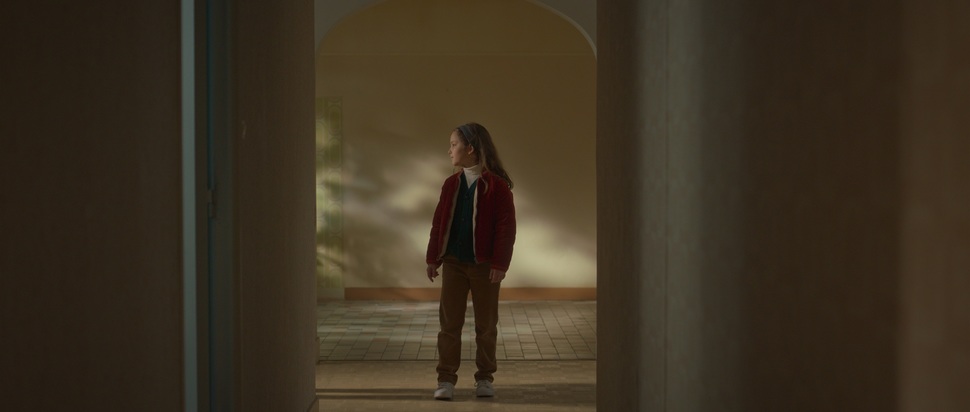Time Warp: Céline Sciamma on Petite Maman
Portrait of a Lady on Fire and Tomboy director Céline Sciamma returns to the world of childhood in her intimate time-travel film Petite Maman, in which a grieving eight-year-old girl meets her mother at the same age
It all started, somewhat unexpectedly, with a courgette. At least, that's what Céline Sciamma – the acclaimed director of Portrait of a Lady on Fire, Tomboy, and Girlhood – recalls when tracing the origins of her new film Petite Maman, a tale of an eight-year-old girl encountering a childhood version of her mother after a family loss. Absorbed in writing what would become her magnificent Portrait of a Lady on Fire and promoting My Life as a Courgette, a stop-motion animation for which she wrote the script, the inspiration for Petite Maman suddenly struck.
“For the first time in my life, I actually had the idea for a film while [writing another], which never happens,” Sciamma laughs. “But My Life as a Courgette was the first time I officially wrote for a kid audience and I learned a lot from that process. I think even Portrait of a Lady on Fire benefitted from the fact I had been writing characters who are very straightforward with their emotions and dialogues – it freed me regarding expressing feelings. I’d been struggling with writing Portrait of a Lady on Fire, a film I gave up on multiple times, and suddenly this image appeared of two little girls building a treehouse, and one of them was the mother of the other.”
It might sound – and indeed is – fantastical, but Petite Maman’s most magical quality lies in Sciamma’s signature intimacy, an understated and profoundly honest naturalism which even the most genre-heavy of stories cannot shake. Absent is the elaborate worldbuilding that might be expected from a time-bending narrative: instead, Petite Maman’s world is stripped back, small and gentle, inhabited by two little girls bound to each other by a tender and very serious love. “It’s a time travel film, but it's timeless,” Sciamma stresses. “It’s not tourism in the past or in the future. It’s intimate time travelling, about finding a common time and a common space.”
There is perhaps no greater shared commons than that of childhood, yet very few adults – let alone directors – are able to recall its wonder, possibility and liminality with the uncompromising sincerity that underlies Sciamma’s craft. My Life as a Courgette might have been her first film for a young audience, but Sciamma has been writing children for years: awkward, gangly Marie, desperately desiring a fellow classmate in Water Lilies; the grave Laure/Mickaël exploring their gender identity in Tomboy. Their worlds may be small, their language direct, but Sciamma’s child characters own their right to emotional complexity with sober determination, led by a director who takes their experiences always, unwaveringly seriously.
“It's like with women characters,” Sciamma says. “It's about giving the full range to a child character and respecting them fully, looking at how serious and committed they are, how much they care. When you collaborate with kids, you have access to all of that. So it really doesn't feel like a fantasy.” This approach, rooted in mutual trust and recognition, spills over on to her management of the set, which emphasises collaboration and confidence while also entrusting her young actors – in this case sisters Gabrielle and Joséphine Sanz, who play mother and daughter Marion and Nelly respectively – with her script.
“Directing an actor is a lot to do with rhythm and choreography,” Sciamma adds, “whether you're working with Adèle Haenel or Joséphine Sanz. It's about: ‘OK, the scene is you getting from the kitchen to the room, we've got to find the rhythm together.’ It's like music. I see it much more as music.”
And Petite Maman is just that: a delicate composition of care and attention that bind together a world ready to unravel, an orchestration of the tenderly collapsed boundaries that define Sciamma’s work. “In each film, we take some time out of the world to love each other, to meet each other,” Sciamma says of her filmography. “And I think this has a lot to do with the fact that I'm looking at women characters. If you want to see them in their full range and outside of performing for society, you have to put them on an island. Even in a time travel machine. It's always about finding the room where you can be yourself; a room of one's own but for two people, or three.”
It is hard not to think of Portrait of a Lady on Fire here – a lesbian love story set on a Breton island that set the film world appropriately ablaze – and it is striking how often Sciamma herself references it. “But they’re kind of the same, right?” she asks eagerly. “But more democratic. Some people couldn't take to Portrait of a Lady on Fire because they couldn't see themselves in it. I really wanted to put everyone in the room this time: mothers, grandmothers, kids. It’s this cinematic experience of feeling seen, which is more and more my obsession. But Petite Maman and Portrait of a Lady on Fire are holding hands.” Sciamma smiles. “I always picture my films like that. Holding hands.”
Petite Maman will be showing in cinemas from 19 Nov and streaming on MUBI on 4 Feb 2022
